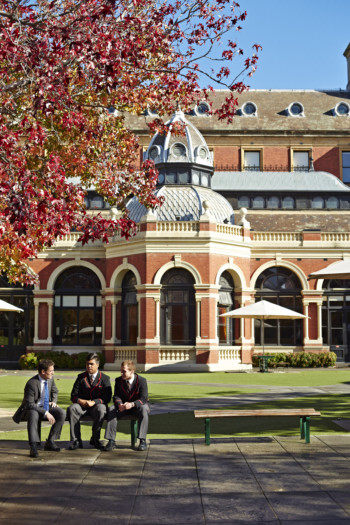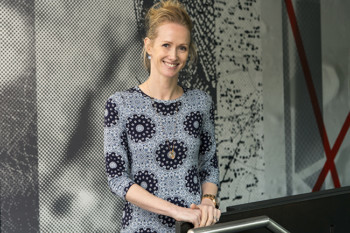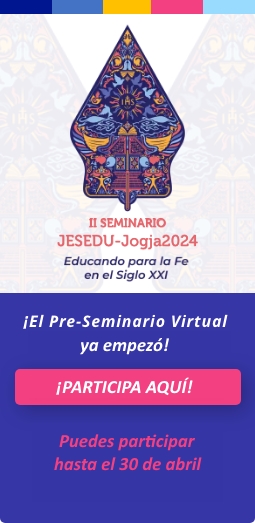This year, the students on the Senior Campus of Xavier College have been challenged to have the courage to do what we say. To act in a way that is faithful to the ethos of our school, our tradition, our story. The Xavier story is one that combines 450 years of history with each of our own individual contexts. Each boy’s story here at Xavier contributes to the broader story of who we are and who we want to be as we move forward with courage and conviction in our times. As a school, what we teach and how we teach it informs the world of who we are and what it means to be a student in a Jesuit school. Essentially, our pedagogy is informed by our practice.
 Xavier College is a busy place, and it hums with a sense of purpose. Students spill out of classrooms and into busy corridors. Teachers duck and weave, navigating through the frenetic movement as our boys gather their belongings with their thoughts, moving with purpose to their next class, sport or performance commitment. For our Year 9s, this has been a year of wonder and adjustment, as they navigated their way through the machinations of our busy school, finding their way to classrooms whilst finding their feet on the next stage of their learning journey. Our Year 10s began to discern their future academic steps through discernment of electives and core offerings. Our senior boys move around the campus with a different purpose. Their focus is on managing assessment deadlines, homework and career aspirations as their time at Xavier comes to a gradual close.
Xavier College is a busy place, and it hums with a sense of purpose. Students spill out of classrooms and into busy corridors. Teachers duck and weave, navigating through the frenetic movement as our boys gather their belongings with their thoughts, moving with purpose to their next class, sport or performance commitment. For our Year 9s, this has been a year of wonder and adjustment, as they navigated their way through the machinations of our busy school, finding their way to classrooms whilst finding their feet on the next stage of their learning journey. Our Year 10s began to discern their future academic steps through discernment of electives and core offerings. Our senior boys move around the campus with a different purpose. Their focus is on managing assessment deadlines, homework and career aspirations as their time at Xavier comes to a gradual close.
Within the day to day of the working week, teachers and students are working towards building the foundations of lifelong learning and accomplishment. Often this hard work goes unseen, and exists in the confines of classrooms or in conversations in corridors. As Ignatian teachers forming young men, we acknowledge that authentic learning is one dimension of a student’s formation but this does not exist only in the classroom; it is present in the yards and the sporting fields, in musicals, in Ignatian service, debating, performances and in the Boarding house. Learning interconnected with every dimension of each student’s lived experience.
As a Jesuit school we have a responsibility to research and investigate current and contemporary trends in education and assess if and how they can be applied to our context, in order to improve our practice at an individual and collective and cultural level. How do we marry the ideals of an Ignatian education with our fast moving and at times self-serving society? At a time when other schools are being identified as ‘thinking schools’ or ‘positive psychology schools’ it can be tempting to find an overarching construct and fit our curriculum to it. Yet we already have one. Ignatian pedagogy challenges us to produce students who seek wisdom, not simply knowledge. In order to facilitate this have explored various contemporary educational approaches during 2016 with a view to integrate them into our curriculum in 2017 and beyond. As with any significant ideological shift, we have to be courageous and committed to looking at our own practice in our own classrooms.
 To become contemplatives actively engaged in learning. Fr Michael Smith, SJ addressed our staff during a Professional Learning Day this year and urged us to ‘take a long, loving look at the real’. By explicitly embedding the Ignatian Pedagogical Paradigm into our teaching and learning context the student as a contemplative will emerge via reflection, experience, evaluation and ultimately, action. In order to be a contemplative in action, our students need to immerse themselves authentically in their study, but equally their commitment to social justice, their ongoing contribution to their sporting team and their connection in the wider dimensions of college life. This is ‘the real’ we ask them to contemplate, to see beyond the acquisition of superficial knowledge. Fr Walter Burghardt SJ put it beautifully when he said, “the real I look at. I do not analyse or argue it, describe or define it, I am one with it…. to look wholly means that my whole person reacts. Not only my mind, but my eyes and ears, smelling and touching and tasting. Contemplation is not study, not cold examination, not a computer. To contemplate is to be in love.”
To become contemplatives actively engaged in learning. Fr Michael Smith, SJ addressed our staff during a Professional Learning Day this year and urged us to ‘take a long, loving look at the real’. By explicitly embedding the Ignatian Pedagogical Paradigm into our teaching and learning context the student as a contemplative will emerge via reflection, experience, evaluation and ultimately, action. In order to be a contemplative in action, our students need to immerse themselves authentically in their study, but equally their commitment to social justice, their ongoing contribution to their sporting team and their connection in the wider dimensions of college life. This is ‘the real’ we ask them to contemplate, to see beyond the acquisition of superficial knowledge. Fr Walter Burghardt SJ put it beautifully when he said, “the real I look at. I do not analyse or argue it, describe or define it, I am one with it…. to look wholly means that my whole person reacts. Not only my mind, but my eyes and ears, smelling and touching and tasting. Contemplation is not study, not cold examination, not a computer. To contemplate is to be in love.”
Reflection is a key component of an Ignatian education and is the process whereby the student makes the learning experience his own. In a Jesuit school, we use the term reflection to mean a thoughtful reconsideration of some subject matter, experience, concept or purpose in order to grasp its significance more fully. Thus, reflection is the process by which meaning surfaces in human experience. If learning were to stop at the mere acquisition of content, the collection of knowledge rather than the curation of it, the experience of learning would not be Ignatian. It would lack the key component of reflection wherein students are impelled to consider the human meaning and significance of what they study. This meaning enables them to become engaged learners who grow as persons of competence, commitment conscience and compassion, uncovering the contemplative in each student.
At the conclusion of every academic year we reflect and are reminded that a true Ignatian education is not solely focused on academic results. A Jesuit education has a clear purpose: the development of a well-rounded person of competence, conscience, compassion and commitment who will be of service in the world and who has the generosity to make a significant contribution. A graduate from Xavier College should be aiming to strive for the Magis, seeking ‘the more’ in every dimension of their lives; spiritually, emotionally, intellectually and of course, academically.
In this blog series entitled “Conversations in Context: Teaching and Learning in a Jesuit School” or in short “Teaching and Learning in Context” we present articles written by Melinda Roberts. These originally appeared in Xavier College’s fortnightly newsletter, written for the school community and published on the school website. We are happy to share these with the wider Jesuit education community. To read the previous blog click here.

Melinda Roberts is the Head of Teaching & Learning at Xavier College in Melbourne, an all-boys Jesuit high school in Australia. In the last twelve months, she has led a number of significant changes at a physical, philosophical and ultimately cultural level, with the aim of ensuring Xavier remains committed to its mission of excellence in education and the formation of reflective, compassionate and articulate men and women of Christian faith, hope and love who will provide outstanding service and leadership in our world, while still producing excellent academic results. Her articles in this blog series provide an insight into this challenge, one which is invariably shared by Jesuit schools across the globe.
Inicia sesión o Hazte miembro
para crear y ver comentarios
